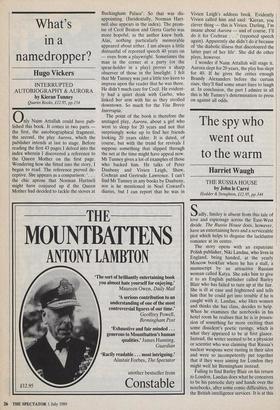The spy who went out to the warm
Harriet Waugh
THE RUSSIA HOUSE by John le Carre Hodder & Stoughton, £12.95, pp.344 adly, Smiley is absent from this tale of love and espionage across the East-West divide. The Russia House does, however, have an entertaining hero and a serviceable plot which helps to disguise the lacklustre romance at its centre.
The story opens with an expatriate Polish publisher, Niki Landau, who lives in England, being handed, at the yearly Moscow bookfair where he has a stall, a manuscript by an attractive Russian woman called Katya. She asks him to give it to an English publisher called Barley Blair who has failed to turn up at the fair. She is ill at ease and frightened and tells him that he could get into trouble if he is caught with it. Landau, who likes women and thinks she has class, decides to help. When he examines the notebooks in his hotel room he realises that he is in posses- sion of something far more exciting than some dissident's poetic ravings, which is what they appeared to be at first glance. Instead, the writer seemed to be a physicist or scientist who was claiming that Russia's nuclear weapons were rusting in their silos and were so incompetently put together that if they were aiming for London they might well hit Birmingham instead.
Failing to find Barley Blair on his return to London, Landau does what he conceives to be his patriotic duty and hands over the notebooks, after some comic difficulties, to the British intelligence services. It is at this point that the novel really gets under way. The notebooks have to be assessed and the missing Barley found. Are the notebooks genuine or could they be a plant? If genuine, is it a good thing that Russia's nuclear threat is a mirage or does the fact that its weapons are unreliable pose a different kind of danger? Who is the scientist who has written the notebooks? How important is he? Who is Barley Blair and what is his connection with the writer of the notebooks? Is he trustworthy? Could he be a plant? Nothing that one learns about Barley is reassuring. He is a middle-aged, chess-playing, jazz-playing amiable drunk who has left a debris of wives, children, mistresses and bad debts. He runs the family publishing business which deals in Mills-and-Boon-style love- stories into which he tries to infiltrate some difficult books more to his taste. This is why he sometimes attended the Moscow bookfair. We do finally catch up with him.
Barley tells the authorities that he has never met Katya but he does recall that a year earlier, while attending the Moscow bookfair, he had an alcoholic evening in a dacha with some dissident poets and wri- ters. There a mysterious and melancholy man, nicknamed Goethe, inspired by some drunken clichés of Barley, made Barley listen to some intense stuff about how it was possible without disloyalty to betray your country 'provided you betrayed what you hated and fought for what you love'. He had forced Barley to say that if he, Goethe, should behave like a hero, Barley would behave 'like a merely decent human being'. Barley, however, signally fails to keep his side of the bargain and instead of publishing Goethe's revelations for the good of mankind allows the British and American Secret Services to use him for their own ends.
Barley is the sort of romantic creation that could have come from the pen of Elisabeth Jane Howard. He is attractive, sensitive, unpredictable, unreliable and clever. The main tension of the novel lies in this unpredictability. Will he, when pushed, hold strong to the interests of Her Majesty's Government and that of the United States? This, of course, cannot be tested until he is sent into the field, which Is where the love interest comes in.
The second half of the novel tells what happens when Barley goes to Russia and meets Katya. It is essentially a love story, with some enjoyable shenanigans thrown in, showing how something as unexpected and banal as two middle-aged people falling in love can make the best-laid plots go awry. Unfortunately, the love affair really is mundane, added to which the novel is continually pulled out of kilter by the introduction of an unnecessary charac- ter called Harry Palfrey, the dim, damply squishy MI6 legal man, who tells the story. He continually interferes with the smooth running of the plot by interrupting with boring interjections about his own dismal life and angst. Despite all Palfrey's efforts, however, this is, if not vintage le Carre, a perfectly enjoyable excursion into the murky underground world of spies that he has made his own.











































 Previous page
Previous page